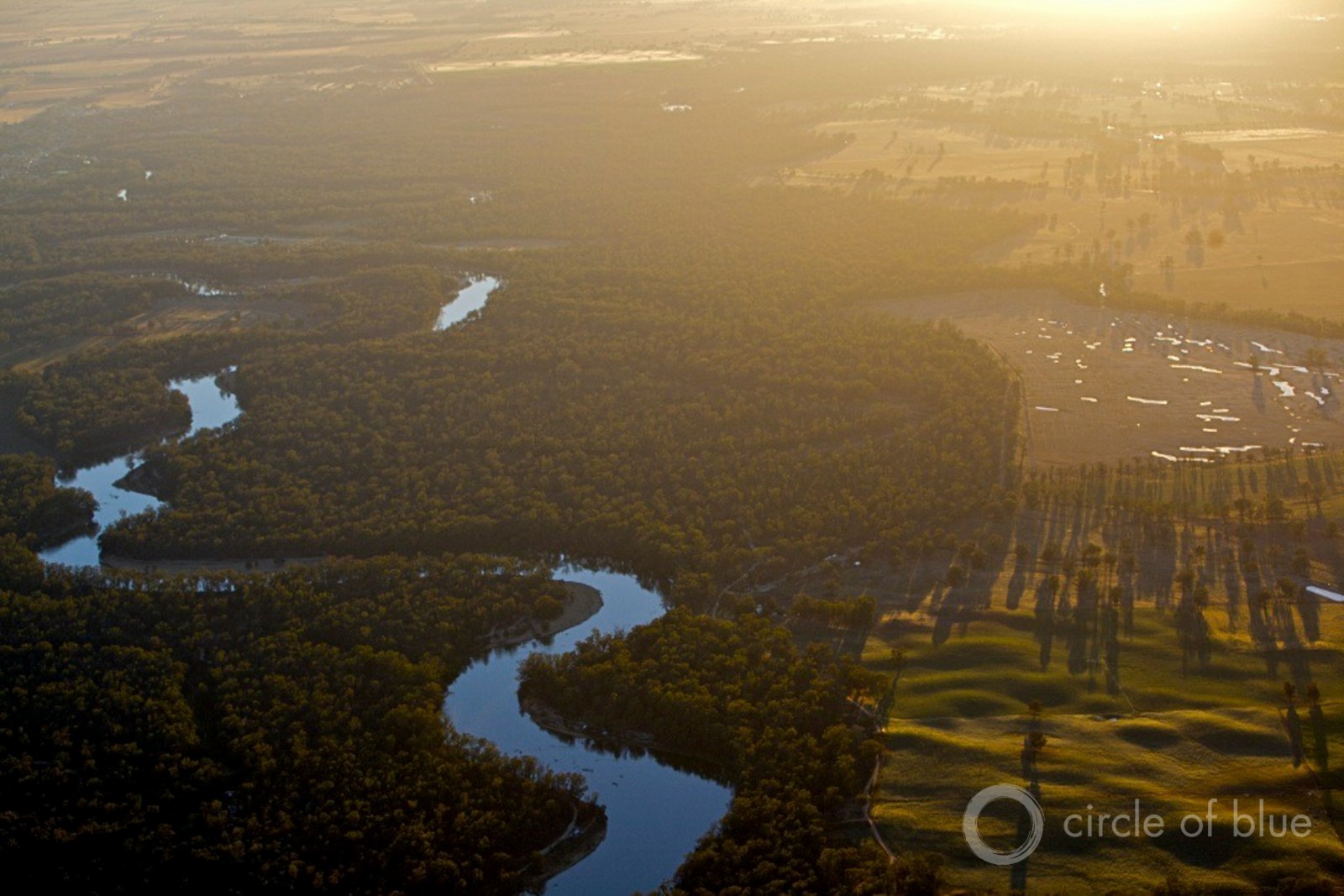The Stream, December 18, 2024: Extreme Weather, Flooding Linked to Global Rise in Malaria Cases for Fifth Consecutive Year

Australia’s Murray-Darling basin. Photo © J. Carl Ganter/Circle of Blue
YOUR GLOBAL RUNDOWN
- The populations of more than 70 waterbird species in eastern Australia are down 50 percent compared to last year, a result attributed to wetland loss and drying rivers.
- By 2050, one in four properties in England could be vulnerable to flooding as a result of both intense rain events and inadequate infrastructure.
- For the fifth consecutive year, the number of global malaria cases rose — an increase that coincides with flooding and extreme precipitation.
- The water supplies of Mozambique and Mayotte are slowly being restored in the aftermath of Cyclone Chido, which is feared to have killed hundreds or thousands of people along its path.
Farmers and activists in Serbia continue to organize in opposition to a proposed 400-hectare, government-backed lithium mine in the country’s western region.
“I’ve lost four years of my life. I’ve aged. My hair’s turned grey. But, I’ve also met many wonderful and kind people.” — Zlatko Kokanovich, a farmer in western Serbia.
Tensions in Serbia remain high as a proposed lithium mine, marketed as the continent’s largest lithium and boron extraction project, continues to divide its government and population, France24 reports. The opposition movement is led by farmers whose village, homes, and lands are threatened to be destroyed should Rio Tinto, a mining company, proceed with the development.
After a successful popular resistance two years ago, the Serbian government reinstated Rio Tinto’s mining license this July. The country stands to profit from its large swath of lithium deposits, which when mined and processed are a key component of electric vehicle batteries. Rio Tinto and its supporters are calling for the public to see the mine as a key player in the transition to cleaner transportation. But local ecological concerns for water and soil pollution, as well as growing speculation of political corruption, have fueled grassroots protests in small towns and larger cities.
In recent months, this divisiveness reached new levels. In November, protestors threw eggs at the company’s headquarters outside of Belgrade. And a pro-mine website named “We Will Dig” was recently launched, which features anonymous articles that single out anti-mine activists and label them as terrorists.
— Christian Thorsberg, Interim Stream Editor
Recent WaterNews from Circle of Blue
- Safe Drinking Water Act Turns 50 — Landmark law encounters new problems, enduring challenges.
- The Year in Water, 2024 — Risky Business
The Lead
According to the United Nations’ recently released World Malaria Report 2024, the number of malaria cases around the world increased for the fifth consecutive year, rising 11 million to a total of 263 million in 2023. Nearly 600,000 people died from the disease, and 94 percent of all cases occurred in Africa.
As scientists continue to study malaria’s prevalence and trends, climate inequities and extreme weather have become important considerations. Cyclones, heavy rainfall, and flooding — exacerbated or made more erratic by a changing climate — create more ideal breeding grounds for mosquitos. This was observed between 2021 and 2023 in Pakistan, where a 62 percent increase in malaria cases was attributed to catastrophic flooding events that affected some 30 million people.
Concurrently, the communities most affected by malaria are often the most vulnerable — 80 million internally displaced persons or refugees live in countries where malaria is endemic, The Guardian reports — with sub-standard sanitation infrastructure or access. Flooding also disrupts road access, and the delivery of supplies and vaccines.
Another report, published by the Malaria Access Project, estimates that “Africa will see more than 550,000 additional deaths… between 2030 and 2049 due to extreme weather events such as floods and cyclones.”
This Week’s Top Water Stories, Told In Numbers
50
Percent decrease in the last year of waterbird populations in eastern Australia, The Guardian reports. The results come from one of the world’s largest annual aerial bird counts, which surveys more than 70 species over roughly one million square miles on the continent. Scientists identified 287,231 birds this year, half as many as the 579,641 birds spotted last year. Dry conditions, researchers say, are largely to blame for the drastic decrease. The survey also studied wetland coverage — important breeding and nesting habitat for waterbirds — and found that its abundance had also fallen well below the long-term average. Diverting water and constructing dams have dried out floodplains and river systems in the region, they say. After heavy La Niña rains in 2021 and 2022, recovery failed to continue in a drier 2024.
174,158
People in Mozambique and on the small French island Mayotte who have been affected by Cyclone Chido since it made landfall early this week, Reuters reports. As of Tuesday morning, 34 people in Mozambique and 22 people on Mayotte have died, though officials fear that “hundreds or even thousands could be dead” on the island. The priority now, according to authorities, is restoring food and water supplies to combat the growing risk of disease. Decomposing bodies are creating “a sanitary problem” where supplies are currently online. About 22 tons of resources began to arrive by air on Tuesday, when around 50 percent of water supplies were estimated to be back online. The French President Emmanuel Macron has declared a national mourning period and pledged to visit Mayotte in the coming days.
On the Radar
New modeled projections from England’s Environment Agency found that 6.3 million homes are vulnerable to flooding under current climate conditions, and that this number could rise to eight million — one in four English properties — by 2050, The Guardian reports. Models accounted for flooding from sea level rise, rivers, and surface water, with the latter showing the potential to impact 4.3 million properties as drainage systems become inundated with heavy rains. According to the Guardian, “flood protection plans have been cut by 40 percent in recent years because of a lack of investment in defences, with a quarter of major projects abandoned.”
More Water News
World Cup and Weather: Under a high-emissions climate scenario, a dozen FIFA World Cup 2026 venues — along with the 25 biggest soccer stadiums in Europe — could suffer $800 million in damages from extreme weather, flooding, and heavy precipitation by 2050, EuroNews reports.
Everglades Restoration: A new National Academies report detailing the progress of the $21 billion Everglades watershed restoration efforts acknowledges that federal and state agencies have not considered and included the expertise of the Miccosukee and Seminole tribes as much as they should have, Inside Climate News reports.
Christian Thorsberg is an environmental writer from Chicago. He is passionate about climate and cultural phenomena that often appear slow or invisible, and he examines these themes in his journalism, poetry, and fiction.







Leave a Reply
Want to join the discussion?Feel free to contribute!